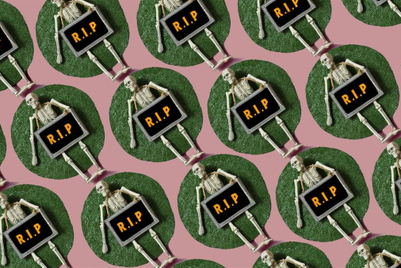
Those of us who have spent many years working across different types of agencies will have noticed a disconnect between values on paper and the way teams connect day to day.
There is often a certain hierarchy in place, paired with a ruthless approach to business and management, that means employees find themselves stretched, fighting an unhealthy “us versus them” culture, and are expected to work until midnight or risk death stares for leaving at 5:30pm. This creates an unhealthy work-life balance that affects the agency’s quality of work because the employee’s wellbeing is at stake.
We’ve seen this first-hand at our own agency and it forced us to make a pretty big business decision. Working with our largest client at the time and giving everything to service an account worth £1m, we found our team members were being destroyed by the negative values that this client held and how they were treated.
Working hard with long hours is all in a day’s work but paired with unkindness, our team members, some of whom were already living with mental health challenges, were suffering even further. I had also had a mini-stroke and heart surgery since starting the company, and when deciding on what action to take, we chose to put our employees first and walk away from that account.
Because we showed where our company’s values were, we gave our employees a better work-life balance and a healthier mindset. This balance means that clients will receive a much higher standard of service as the team genuinely cares about their mission and understands their purpose.
When people are supported and enjoy coming to work it ultimately leads to increased productivity, which is what we see today. It’s why I co-founded “Corporate Kindness”, an initiative to encourage companies to lead with kindness, and it is why organisations such as Mastercard have put their name to it.
Corporate Kindness is a unique way of looking at how your bottom line is affected when you put your employees first, and agencies in particular can benefit. Studies have shown that kindness improves productivity and lowers employee recruitment and training costs.
Organisations with values that align with Corporate Kindness are likely to be seeing these benefits already because kindness in business extends much further than simply improving the work day.
Agencies will thrive under compassionate and positive leadership. Complimenting co-workers and paying-it-forward are lovely entry-level examples but doing away with the typical line manager hierarchy in favour of a mentor-mentee approach, which positively guides someone towards their career and life goals is a bigger step, but it’s easy and has quick and effective results.
Personal and professional goals are also not independent: who we are at work should be who we are at home. Knowing you bring your true self to the virtual office with support and without judgment promotes self-assuredness and confidence that is a win-win for agencies and employees.
Using kindness to make tough decisions
Having a company culture driven by kindness means putting people before profit, caring about your team and wanting to help them achieve their full potential. In the current environment, sometimes tough decisions have to be made. We’ve been no exception, but it’s how we make them and communicate with our teams that protects that culture.
A great example from earlier this year was the open letter by Brian Chesky, chief executive of Airbnb, explaining how the company arrived at its decision to downsize and who to let go. Most importantly, though, was what was said on how Airbnb was supporting those it could no longer employ by helping them to find other jobs. The vulnerability such leaders are showing, creates the emotional bond both with customers and retained employees, supporting the company through organisational changes.
Kindness culture makes bullying visible
As organisations have increased flexible working and are starting to consider working from home longer term, it will make it difficult to address workplace bullying. Many campaigns have done a great job at highlighting bullying within schools and online, however bullying of adults within the workplace is still a subject many feel too nervous to speak out about for fear of repercussions or embarrassment at not knowing where to go to for help or how to ask for it.
Kindness in business will bring a positive change from two places: a shift in mindset from leadership and positive engagement from employees. By creating a kindness culture, it becomes increasingly difficult for the negative or passive-aggressive treatment of others to be invisible and builds a supportive and safe working environment for anyone affected to feel confident enough to address any concerns.
Kelly Allison is chief executive of digital and brand experience agency KVA and co-founder of #CorporateKindness


.jpg&h=334&w=500&q=100&v=20250320&c=1)


.jpg&h=334&w=500&q=100&v=20250320&c=1)
.jpg&h=334&w=500&q=100&v=20250320&c=1)


.png&h=334&w=500&q=100&v=20250320&c=1)






.png&h=268&w=401&q=100&v=20250320&c=1)


